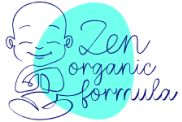
Written by
ZOF Support
Published on

By the time your baby turns one, you’ve probably gotten into a bit of a rhythm with feeding. Formula or breast milk, solids, a few snacks… It's a big shift from those early newborn days. Then suddenly, you see Stage 3 formulas on the shelf and start wondering: Is it time to make the switch? Is Stage 3 formula something my toddler has to have?
Let’s break it down together!
What is Stage 3 formula, exactly?
Stage 3 formula is often labeled as “toddler milk”, “follow-on milk,” or “growing-up milk,” and it’s designed for children roughly 12 months and older. These formulas are meant to complement a toddler’s diet as they transition from mostly milk to a mix of solid foods, water, and milk-based drinks.
In European organic formulas, Stage 3 typically contains slightly higher levels of certain nutrients like iron, calcium, and vitamin D to support your child’s development during the active toddler phase. After all, they need to get all that boundless energy from somewhere! Some also contain DHA, prebiotics, and other supportive ingredients that are still beneficial after infancy.
Does your toddler need it?
This really depends on a few things:
- How well your child is eating solids
- Whether they’re still nursing or drinking infant formula
- Your pediatrician’s guidance
- Your own peace of mind
If your toddler is getting a wide variety of healthy foods and drinking whole milk (or a pediatrician-recommended alternative if they’re allergic or sensitive to cow’s milk), they might not need Stage 3 formula. But if you feel they could use a little more nutritional support, whether they’re picky eaters, still adjusting to solids, or going through a growth spurt, it can be a helpful option to reassure you they’re getting the calories they need.
Why some parents choose to continue with formula
Many parents who use European organic formula feel more confident continuing with a product they already trust. The clean ingredients, transparent sourcing, and gentle recipes are often a big reason they started using it in the first place.
Stage 3 offers a way to keep that going a little longer, especially if your toddler isn’t quite ready to make the full switch to regular milk. It’s also useful for families who travel a lot, need something easy for daycare, or just want a little extra nutritional insurance during their unpredictable toddler era (who’s going through the ‘throw everything new on the floor’ phase currently? We feel you!)
Our Recommendations
If you’re considering Stage 3 formula, here are a few trusted options that many parents turn to during the toddler transition:
-
HiPP Dutch Stage 3 Bio Combiotik is a favorite among parents looking for a clean, gentle formula that includes prebiotics, probiotics, and DHA. It’s designed to be easy on little tummies and offers well-rounded support for active toddlers.
-
Holle German Cow Stage 3 is a great choice for families who value simplicity and biodynamic farming practices. Their formulas are known for short, clean ingredient lists and high-quality milk sourcing.
-
Jovie Goat Stage 3 is another excellent option for toddlers who may be sensitive to cow’s milk. It’s rich in nutrients and made with full-cream goat milk, which some babies find easier to digest.
-
Nannycare Goat Milk Stage 3 offers a creamy, whole-milk-based formula with naturally occurring nutrients, using milk sourced from New Zealand goats.
-
Kendamil Classic Stage 3 provides a vegetarian-friendly recipe (no fish oil) and uses whole milk as a natural fat source, with ingredients sourced entirely from the UK.
-
Lebenswert Stage 3 is ideal for parents who want something incredibly straightforward: just the essentials, with milk from organic German and Austrian farms.
Every baby is different, and there’s no one-size-fits-all formula (if you’ll pardon the pun). If you’re not sure which one might be the right fit for your toddler, we’re always here to help guide you through the options with our Formula Finder quiz.
The bottom line
Stage 3 formula isn’t essential for every toddler, but it can be a smart choice depending on your child’s needs and your feeding goals. Think of it as one option in your toolkit, and one you can always go back on if you feel differently. Whether you choose to continue with toddler formula or make the switch to milk and solids, what matters most is that your child is getting the nutrition they need in a way that feels right for your family.
If you’re ever unsure, your pediatrician can help guide the decision. And remember: whatever route you take, you’re doing a great job navigating a stage that’s full of growth, messes, learning, and love.
Check out all of our top quality European organic Stage 3 formulas for your baby’s next step here!




